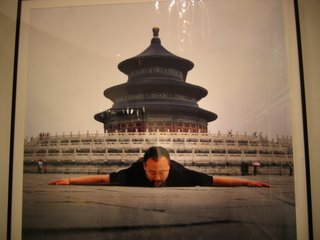Hints of punk in China


My discoveries through interviewing Cang Xin did not come from his explanations of his art or practice, but his life story and attitude.
Reigning from the exuberant Beijing's East Village, Cang appears to tell the story of someone who has his roots in Western punk philosophies, but interestingly drawing entirely from Chinese reference points.
Cang Xin is amongst the most renowned Chinese contemporary performance artists today. He is best known for his 'licking performances' where he believes in a shamanistic manner to communicate with various people and objects he comes in contact with. He is also known for his performances where he experiments with his identity and role in society.
Generally music in China is criticized to be largely imitation of Western trends without a real understanding of its history and developments. Though there is a lot of imitation there is still movement that stems from the core of the society.
One criticism of many media saturated ‘punk’ icons is that they pretend to act troubled and poor for the sake of image. They appear to have something to say, but in reality have no genuine understanding of the life they go on about.
For Cang, the motivations for his artwork began with very dire moments of his life. At the age of 5 Cang's parents were forced to divorce. During the Cultural Revolution, the government separated those with land and those without land. Cang’s Mother was left to raise Cang and his older brother on her own. She was deeply affected by the divorce and since their Father was not around, she would beat them. Cang ended up leaving home at the age of 12. From this experience, Cang felt he had something to say.
Later on, Cang began studying Chinese oil painting, music and philosophy. He became heavy into "rock and roll music" even played in a band in 1998 called Pangolin (Chuan Shan Jiâ) (an animal forbidden to be eaten in China). He believes music and philosophy were the two things that sparked him on his in his artistic practice.
In 1989 another event took place that Cang said was a major influence on him. During the June 4th Incident at Tiananmen Square, Cang was imprisoned for two months. Cang suffered a lot during this time. After getting out of prison, he had trouble talking about his struggles and the things that happened. He began his licking communication to help cope with the feelings trapped inside. He says his performances helped him find his true self and to express himself to correct these problems.
In 1993 Cang moved to the East village in Beijing and began working with artists like Ma Lieuming, Zhang Huan, and Ai Wei Wei who now make very recognized work.
Though Cang no longer plays in bands nor did he mention that it was a particular large part of his career, it was the way he described his life and motivations that drew me to think that he seemed somehow innately punk. His desire to say something about his experiences and act out and find expression through alternative means is something that resonates with the punk movement. His interest in “rock and roll” music only confirms the influence. Curiously enough, Cang also draws entirely from very significant and uniquely Chinese politics, history and events. It is these events and attitudes that have become the underlying current for his work.
Though Cang agrees there is still a lot of imitation in Chinese music that tends to dominate the scene, there are still a lot of bands that speak from the roots of the society and culture.
Some Chinese bands of note from Cang:
Èr Shôu Méi Gùi – Second Hand Rose Band
“Zi Ri”
Mêi Hâo Tào Diàn - Glorious Pharmacy
No
Events like the Cultural Revolution and the June 4th Incident have become major influences on some of the music and art perpetuating out of China. It is this deeper understanding of life and struggle that goes far beyond mere copying of image, lifestyle, and trend.
www.rockinchina.com


0 Comments:
Post a Comment
<< Home